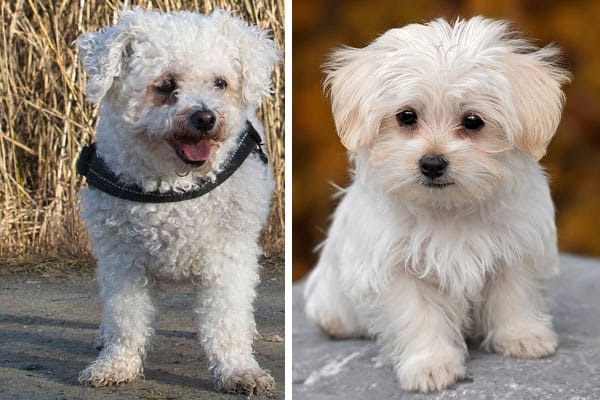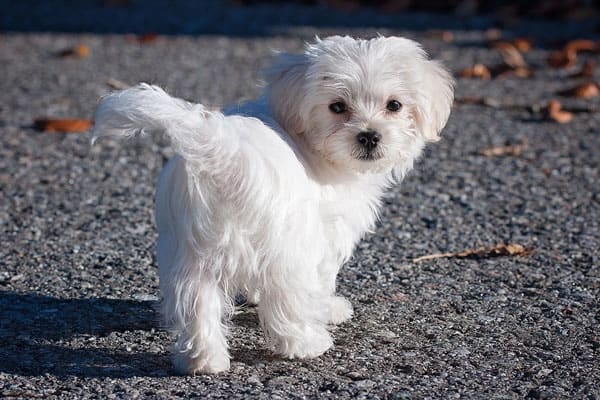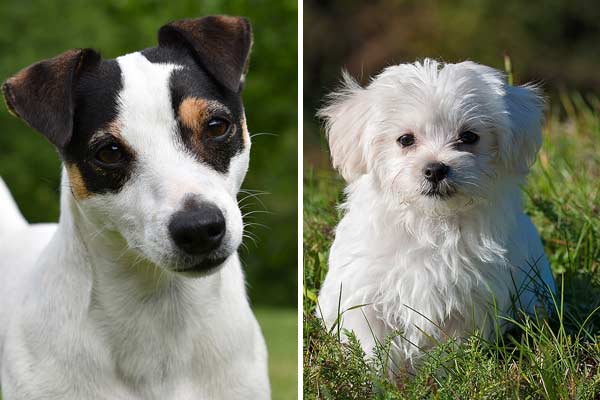Are Maltese Aggressive Dogs: Discover the Maltese Personality

To see a Maltese dog is often to fall in love. These pint-sized pups, with their pure white long hair coats and adorable black button eyes, have been loved and adored by people for centuries.
While the Maltese dog certainly doesn’t look aggressive, some toy-sized dog breeds are known to be aggressive. If your family continues small children or small prey-type pets, it is worth asking whether the Maltese might be aggressive towards either.
Read on to learn more about the Maltese personality and determine if this might be the right canine companion for your family.
Are Maltese Aggressive Dogs?
The only time a Maltese dog is likely to be aggressive is if the dog is mistreated in some way.
Seen through this toy-sized dog’s eyes, mistreatment might look like deliberate neglect, or it could be as simple as too-rough play, even if unintentional.
Because these dogs are so tiny, weighing less than seven pounds fully grown, careful handling is key to avoiding any display of canine aggression.
Learn Fascinating Historical and Breed Facts About the Maltese
This short video shares fascinating information about the history of the Maltese breed and explains what to expect with this dog’s personality.
Most importantly, as the video points out, the Maltese is relatively small and needs careful handling to avoid injuring this tiny pup. This tip also hints at why a teensy Maltese dog might display aggressive behavior, as we will discuss next here.
Where Does the Maltese Dog Come From?
The Maltese bears the nickname “ye ancient dogge of Malta,” as the American Kennel Club points out.
Why? Because the Maltese are an ancient dog breed initially bred on the island, this dog takes their breed name.
As Canine Perspectives Dog Trainer explains, the Maltese has been bred as a companion to people for centuries. This dog is often said to have a “heart of gold.”
The Maltese dog has once nicknamed the “sleeves dog” because royal women would tuck their pups into their flowing sleeves and carry them around town!
Any dog bred to spend the day riding around in their owner’s sleeve wouldn’t necessarily be associated with an aggressive temperament.
Are Maltese Dogs Ever Aggressive?
As you learned earlier here, the Maltese dog breed rarely weighs more than seven pounds – and that weight includes the full-length show coat.
The full-grown adult Maltese dog rarely stands more than nine inches from paw pads to shoulders. This dog is short and slight.
So why would a Maltese ever think to behave aggressively since everything and everyone is more significant than they are?
Here are a few key reasons you might witness aggression in a Maltese dog. In the following sections here, we will explore each possibility in depth.
Maltese Aggression Due to Health Problems
As the Animal Health Center New Hampshire explains, health problems can sometimes trigger aggression in dogs, regardless of the breed.
According to the Canine Health Information Center (CHIC), the Maltese have three main known genetic health concerns: cardiac, patellar luxation (trick kneecap), and liver issues.
Any dog that is feeling poorly may behave with aggression. This is primarily because the wild instinct to try to disguise weakness or illness is still very much present in domestic companion canines.
Dogs that don’t feel well may also act aggressively because they are disoriented, nauseous, weak, anxious, or simply not understanding what is happening to them.
For example, patellar luxation is a genetic malformation disorder that can cause the knee joint to dislocate spontaneously.
If your Maltese is in pain, but you don’t realize the knee is out of the socket and needs medical care, you may get a growl or a bite (or both) as a sign all is not well.
The Animal Health Center New Hampshire points out that thyroid issues are not uncommon in Maltese dogs and that thyroid or hormonal imbalances can sometimes trigger acts of aggression in these dogs.
Maltese Aggression Due to Poor Training and Socialization
As Yaletown Dog Training highlights, the Maltese (and any dog breed) can sometimes display aggression because they need more socialization and training.
However, before deciding you understand precisely what is causing your Maltese to act aggressively, it is also important to first step back and assess the entire big picture.
One common reason Maltese may display aggression is when they are in a multi-pet family with larger dogs or dominant cats. A Maltese may need to compete for your time, attention, food, toys, or other vital needs.
PetCare RX explains that Maltese has a long history of serving as a watchdog and guard dog to their people.
These dogs may not be particularly intimidating in size or appearance, but they are always ready to use their bark to alert their people that there is an intruder or that something is amiss.
Suppose a Maltese puppy does not receive early socialization and training to differentiate between a friend, a neutral situation, and a potential threat. In that case, you may see aggressive behavior from that dog in adulthood.
Maltese Aggression Due to Being Spoiled
As far as canine cuteness goes, the Maltese rank right up at the top. These dogs look just like teddy bears, especially in the short puppy cut that is so popular for long-haired dog breeds!
While the Maltese can look just like a toy, this can backfire when you become too indulgent towards your dog.
The Maltese do not rank very high on some intelligent canine tests. ScienceAlert published a list of the 79 most intelligent purebred dog breeds, and the Maltese ranked 59th.
But this particular intelligence test focused on trainability. Specifically, the test ranked dogs according to how quickly they learned a new skill and how motivated they were to repeat it.
The Maltese dog’s low ranking does not indicate this dog breed is not intelligent. On the contrary, the Maltese are brilliant! But they are not very motivated to obey people. They prefer to keep their own counsel.
So you may find that your Maltese might display aggressive behavior to resist doing what you want them to do.
While this dog breed tends to use cute behavior more than aggressive behavior to do this, both can work with an unsuspecting dog owner.
In other words, you will have to be very disciplined and focused on training to ensure you are training your Maltese dog and not the other way around!
Maltese Aggression Due to Owner Over-Protectiveness
You are probably starting to pick up on the fact that many of the issues the Maltese dog breed struggles with regarding aggressive displays relate to their tiny size.
With a small dog, there will always be some special issues you need to remain mindful of.
And sometimes, the underlying issue when a dog displays aggression can be traced back to that dog’s owner – you.
For example, let’s say you decide to adopt or purchase a tiny Maltese puppy. Your dog will probably come to you weighing just three to four pounds – a tiny pup.
So you are very, very careful with your tiny Maltese. You handle your dog with kid gloves and insist that your friends and family do the same. You jump anytime there is a perceived threat and pamper and indulge your dog at every turn.
Even after your Maltese puppy grows up and has learned the ropes of family life through training, socialization, and observation, you may still have those same overprotective tendencies.
Dogs are very attuned to people. In fact, according to New Scientist, canines are so attuned to people that they even developed alterations in their eyebrow muscles that change their expressions!
So you can bet your Maltese dog notices how high-strung you are regarding their safety and protection. This may provoke your dog to act anxiously or aggressively towards other people, family pets, strangers, or strange animals.
To dial down the aggression, you must change your behavior first.
Dealing with Maltese Aggression
Before dealing with displays of aggression from your Maltese, you must first understand what is causing them.
Why is your dog behaving aggressively? Are they sick or hurt? Do they need more training and socialization? Are you being over-indulgent or over-protective? Are they being handled too roughly?
Once you identify the issue, sometimes all that is required is some simple adjustments, and the aggression goes away.
But if your dog continues to behave aggressively despite your best efforts, it is time to seek help. A professional dog trainer can work with you to solve the problem.






I have a 10 year old Maltese that we adopted from a hoarding situation at approx. 5 years old. Very shy, scared (I think she was born into the situation. She doesn’t know how to play, is not socialized). She has become a one person (to me) dog pretty much from day 1. She is very protective of me. She barks, growls, lunges, and started biting pretty much anyone that gets close to me, including my husband. The kennel will no longer board her because of her behavior. I don’t board her often, 2 times/year for approx. 1 week at a time. Her behavior has gotten worse, the lunging & biting are new. She interacts with my husband on her terms. When he takes her potty, she hides under furniture, barks, growls, and now tries to bite him (she seems scared (for no reason except it’s not me). Once he gets a hold of her, she lets him put her harness and leash on with no problem. HELP, I don’t want to give her up (I know what her fate would be) How do I help her?